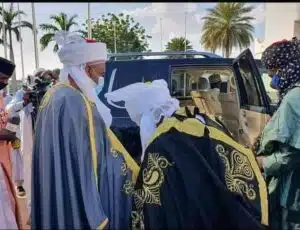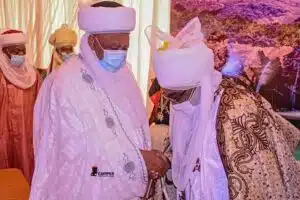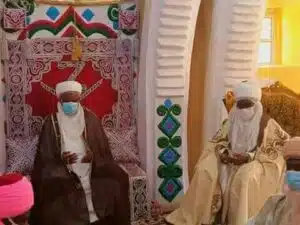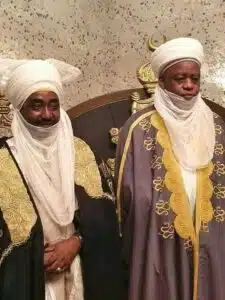Uthman Ɗanfodio’s appeal to justice and morality rallied the outcasts of Hausa society. He found his followers among the Fulɓe. The Fulɓe were primarily cattle pastoralists. These pastoralist communities were led by the clerics living in rural communities who were Fulfude speakers and closely connected to the pastoralists.
The Fulani would later hold the most important offices of the new states. Hausa peasants, runaway slaves, itinerant preachers, and others also responded to Uthman’s preaching. His jihad served to integrate a number of peoples into a single religio-political movement.
In 1802, the ruler of Gobir, Yunfa who was said to be one of Ɗanfodio’s students, turned against him, revoking Ɗegel’s autonomy and attempting to assassinate ƊanFodio.
ƊanFodio and his followers declared Hijra(migration) and fled into the northwestern grasslands of Gudu 30 miles (48 km) to the northwest, where they turned for help to the local Fulani nomads.
In February 1804, Uthman’s followers at that time entitled him as a Supreme Leader of Muslim faithful (Sarkin Muslmi “Amir al-Mu’minin”).
The rulers of Gobir forbade Muslims to wear turbans and veils, prohibited conversions, and ordered converts to Islam to return to their old religion. In his book, Tanbih al-ikhwan ‘ala ahwal al-Sudan (“Concerning the Government of Our Country and Neighboring Countries in the Sudan”), Usman wrote:
“The government of a country is the government of its king without question. If the king is a Muslim, his land is Muslim; if he is an unbeliever, his land is a land of unbelievers. In these circumstances it is obligatory for anyone to leave it for another country”.
Usman did exactly this was when he left Gobir in the year 1802. Yunfa then turned for aid to the other leaders of the Hausa states, warning them that Ɗanfodio could trigger a widespread jihad.
In June, 1803 Usman Ɗanfodio was proclaimed Amir al-Muminin or Commander of the Faithful in Gudu. This made him a political as well as religious leader, giving him the authority to declare and pursue a jihad, raise an army and become its commander. A widespread uprising began in Hausaland.
The leadership of this uprising was largely composed of the Fulani and widely supported by the Hausa peasantry, who felt over-taxed and oppressed by their rulers. ƊanFodio started the jihad against Gobir in 1804.
At the time of the war Fulani communications were carried along trade routes and rivers draining into the Niger-Benue valley, as well as the delta and the lagoons.
The call for jihad reached not only other Hausa states such as Kano, Daura, Katsina, and Zaria, but also Borno, Gombe, Adamawa (Fombina), Nupe.
Thus, the following flag bearers of Shehu Usman Ɗanfodio and the ancient Hausa Kingdoms he sent them to take over the mantle of leadership from the then Hausa Kings and serves as ‘Amir’ or ‘Umara’, meaning Emir(s):
Abdullahi ƊanFodio – Gwandu (In the present day Kebbi State).
Malam Suleimanu – Kano (In the present day Kano State).
Malam Musa Suleiman Bamalli – Zazzau (In the present day Kaduna State).
Modibbo Adama – Fombina (In the present day Adamawa State).
Ummarun Dallaji – Katsina (In the present day Katsina State).
Muhammad Moyijo – Kabbi (In the present day Kebbi State).
Abu Hamid – Zamfara (In the present day Zamfara State).
Malam Isiyaka – Daura (In the present day Katsina State).
Modibbo Bubayero – Gombe (In the present day Gombe State).
Malam Yakubu – Bauchi (In the present day Bauchi State).
Malam Alimi – Ilorin (In the present day Kwara State).
Malam Dendo – Nupe (In the present day Niger State).
Malam Ibrahim Zaki – Katagum (In the present day Bauchi State).
Malam Sambo – Hadejia (In the present day Jigawa State).
Malam Ɗantunku – Kazaure (In the present day Jigawa State).
Muhammadu Manga – Misau (In the present day Bauchi State).
Muhammadu Wabi – Jama’are (In the present day Bauchi State).
Muhammadu Namoda -Kauran Namoda (In the present day Zamfara State).
Sambo Ɗan Ashafa – Ƴandoto (In the present day Zamfara State).
These were all places with major or minor groups of Fulani alims.
By 1808 Uthman had defeated the rulers of Gobir, Kano, Katsina, and other Hausa Kingdoms.
After only a few years of the Fulani War, Ɗanfodio found himself in command of the Hausa states that turns to be the Fulani Empires. His son Muhammed Bello and his brother Abdullahi who participated in the jihad, took care of the Administration.
ƊanFodio worked to establish an efficient government grounded in Islamic law. After 1811, Usman Danfodio retired and continued writing about the righteous conduct of the Muslim religion.
After his death on 20th April, 1817, his son, Muhammed Bello, succeeded him as Amir al-mu’minin and became the Sultan of the famous Sokoto Caliphate, which was the biggest state in the south of the Sahara at that time.
Ɗanfodio’s brother Abdullahi was given the title of Emir of Gwandu and was placed in charge of the Western Emirates, Nupe.
Thus all Hausa states, parts of Nupe and Fulani outposts in Bauchi and Adamawa were all ruled by a single politico-religious system.
By the year 1830 the jihad had engulfed most of what are now Northern Nigeria, some part of Niger Republic and the Northern Cameroon.
From the time of Usman ƊanFodio to the British conquest at the beginning of the twentieth century there were nineteen caliphs (Sultans).
It is worthy to note that;
Shehu Usman Ɗanfodio sent a warrior and a learned Islamic scholar, Malam Musa Bamalli (who served as the Commander, a leader and a flag bearer), Musa Bamalli (the flag bearer) was the first Fulani Emir of Zazzau, he was the first to be addressed as an “Emir” rather than a “King” which was used during the Hausa reign, some Emirs of Zazzau emerged from his house, these include Emir of Zazzau, Malam Alu Ɗan Sidi, whom was dethroned by colonial masters as a result of misunderstanding that linger between them and they dethroned him over one hundred years ago, since then the Mallawa ruling clan were not able to ascend the throne until on 7th October, 2020 when Malam Ahmed Nuhu Bamalli ascended the throne of his ancestors, as the 19th Emir of Zazzau in Fulani Ruling clan.
Malam Yamusa, another Islamic scholar and a friend to Malam Musa was made to serve under Malam Musa Bamalli, who later ascended the throne and was considered as the founder of Barebari Ruling Clan of Zazzau), which many Emirs of Zazzau from his house, including the influential Emir, Malam Ja’afaru Ɗan Isiyaku (a close ally of the first and the only Premier of Northern Nigeria, Sir. Ahmadu Bello “Sardauna of Sokoto”).
Malam Abdulkarim who was also a learned scholar, whom Malam Musa Bamalli met on arrival to Zaria was invited to be part of Malam Musa’s cabinet too.
Apart from Yamusa, Abdulkarim whom also ascended the throne as an Emir and was later considered as the founder of Katsinawa Ruling House of Zazzau), which many Emirs like Sarkin Zazzau Muhammadu Aminu (the 17th Emir) and the immediate predecessor of the incumbent one, Late Emir Shehu Idris (the 18th Emir) emerged.
Still on a very strong relationship between the famous Zazzau and the great Sokoto Caliphate, the mother of the incumbent Emir of Zazzau, Malam Ahmed Nuhu Bamalli, Hajiya Hadiza Abdurrahman Bamalli (Kubura), who is a daughter of Abdurrahman Dikko (Turaki Babba of Zazzau) son of Junaidu son of Dangaladima Maicaco Haliru son of Sultan Aliyu Babba (the 4th Sultan of Sokoto), who was a brother to Sultan Umaru (3rd October, 1881 to 25th March, 1891), Sarkin Sudan Ahmadu and Rukayyatu (the mother of Alu Maisango [also known as Aliyu Babba] son of Majekarofi), Alu Maisango son of Maje Karofi was the 7th Fulani Emir of Kano from Dabo dynasty (ruled from 1894 to 1903), Sultan Aliyu Babba (the 4th Sultan of Sokoto) is a son of Sultan Muhammadu Bello son of Shehu Usman Ɗanfodio.
In the same vein, the first daughter of Malam Musa (the flag bearer), Princess Halimatu Musa Bamalli married to Waziri Giɗaɗo of Sokoto, he married her together with Nana Asma’u, a daughter of Shehu Usman Ɗanfodio.
On the Katsinawa ruling house of Zazzau Emirate, the immediate past Emir, Shehu Idris (1975 – 2020) was a son-in-law to Sir Abubakar III (the 17th Sultan of Sokoto 1938 to 1st November, 1988), the father of the incumbent Sultan Sa’ad Abubakar III, as Late Shehu Idris married Princess Mariya Abubakar III.
On the side of Barebari ruling house, a son of Aliyu Babba (the 4th Sultan of Sokoto) married a daughter of Emir of Zazzau Muhammadu Sani son of Yamusa (the 5th Emir of Zazzau who ruled from 15th April, 1847 to April, 1853).
Also there are ties between the ruling houses of Zazzau Emirate since then, up to today which is intermarriage.
A very good example of this, is Malam Ahmed Nuhu Bamalli, the incumbent Emir of Zazzau is a son-in-law of Late Emir Shehu Idris (1975 – 20th September, 2020). There are many or uncountable number of such examples.
Among all these relationships, its only Emir Ahmed Nuhu Bamalli’s case that rouse to the position of an Emir, the rest that were linked to Sokoto was as a result of intermarriages, but haven’t produced any Emir amongst them, they either give out their daughter’s hands in marriage to some Sokoto Princes and vice versa.
The Sokoto Caliphate was a combination of an Islamic state and a modified Hausa monarchy. Muhammad Bello introduced Islamic administration, Muslim judges, market inspectors, and prayer leaders were appointed, and an Islamic tax and land system was instituted with revenues on the land considered as “kharaj” and the fees levied on individual subjects called “jizya”, as in classical Islamic times. The Fulani cattle-herding nomads were sedentarized and converted to sheep and goat raising as part of an effort to bring them under the rule of Muslim law. Mosques and Madrassahs were built to teach the populace Islam.
The state patronized large numbers of religious scholars or Sheikhs. Arabic, Hausa, and Fulfulde languages saw a revival of poetry and Islam was taught in Hausa and Fulfulde.
USMAN ƊANFODIO’S FAMILY
Usman ƊanFodio was described as well past 6 feet, lean and looking very much like his mother Sayda Hauwa. His brother Abdullahi Danfodio (1761–1829) was also over 6 feet in height and was described as looking more like their father Muhammadu Fodio, with a darker skin hue and a portly physique later in his life.
In Rawd al-Janaan (The Meadows of Paradise), Waziri Giɗaɗo Ɗan Laima (1777–1851) listed Ɗanfodio’s wives as:
1. His first cousin Maymuna with whom he had 11 children, including Aliyu (1770s–1790s) and the twins Hassan (1793- November 1817) and Nana Asmaʼu (1793–1864). Maymuna died sometime after the birth of her youngest child.
2. Aisha Bint Muhammad Sa’ad. She was also known as “Gaabɗo” which mean (Joy in Fulfulde) and as “Uwar Garka” In Hausa which mean (a Lady of the House/Compound). “Uwar Garka” was famed for her Islamic knowledge and for being the matriarch of the family. She outlived her husband by many decades.
Among others, she was the mother of Muhammad Sa’ad (1777-…).
Others among the Danfodio’s wives are;
3. Hauwa’u and
4. Hadiza.
He has 23 children, with Muhammadu Bello as the eldest and Isan Kware as the youngest, including Abu Bakr Atiku, Nana Asmau and 19 others, making a total number of 23 children.
It is worth stating that Ibn Fodio in his Allah’s given wisdom envisaged some scenarios, perhaps that was why few days before his death in 1817 he wrote a little, yet penetrating and incisive booklet in his native Fulfulde, which was later given the title “legacy of Shehu Usman bi Fudi”.
One fascinating paragraph stated thus in Fulfulde:
“MI YARI KOSAM E HORDE MUURI-NDE FAA MI HAARI, BIIDO YARATA SAI BAAWO WO-INI HORDE NƊEN, HEBATA YARKI KOSAM NGAM HORDE NDEN FUSAI” Meaning: “I HAVE TAKEN MILK WITH A BENT CALABASH TO THE SATISFACTION OF MY APETITE, WHOSOEVER SAYS WILL STRENGHTEN THE CALABASH BEFORE TAKING THE MILK WILL END UP NOT TAKING THE MILK BECAUSE THE CALABASH WILL BE BROKEN”
This statement may have different meanings and interpretations, but to my mind it means that we should learn, as a people not to think of modifying or altering the blueprint and configuration of action by following exactly what we see is done and in accordance with the dictates of Islam.
For instance, we should not allow alien disruptions and interest in the cherished civilization of Ibn Fodio by not applying his philosophy of serving human kind for the sake of Allah (S.W.T.) and His messenger, Muhammad (S.A.W.).
For he has fought paganism (kufr) and innovations (bidi’ah) in its entire ramification within his limits and abilities, he has set a righteous precedence for us to follow and safeguard.
Therefore, remembering and emulating personalities like Ibn Fodio will undoubtedly make us to strive to work happily for Islam, live peacefully and immeasurably help us to set a successful journey to the hereafter.
His kind of enlightenment is worth commemorating. I ask for the peace and blessings of Allah upon Muhammad, His households and guided companions.
May Allah forgive and bestow His endless mercy upon Usman Ibn Fodio for establishing Dar-al-Islam in Nigeria. I equally crave for righteousness, Allah’s mercy and forgiveness.
Abubakar Muhammad Musa(Saraki) is a Freelance Precision Broadcast Journalist, Public and Current Affairs Commentator, a Linguist and Historian. Hailed from Zaria (the Nigeria’s City Center of Learning, Home of Scholars) and can be reached via @linguistmam on twitter.






